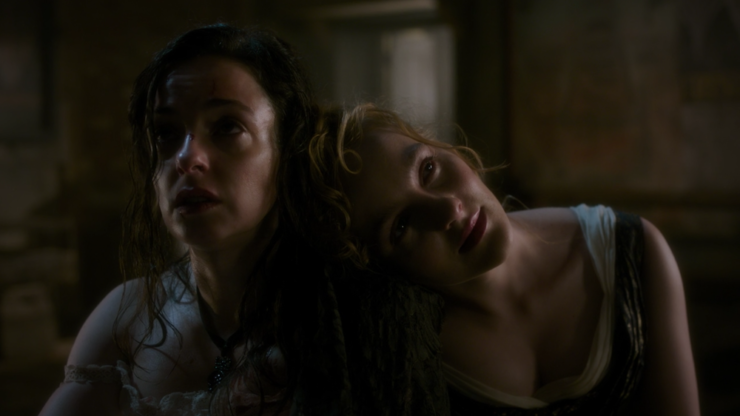The Nevers was to be Joss Whedon’s triumphant return to television, his first original series since 2010’s Dollhouse. In the interim, of course, he made The Avengers and co-created Marvel’s Agents of S.H.I.E.L.D. TV series, but HBO Max’s new drama about female Victorian superheroes seemed to be a return to form for Whedon after nearly a decade entrenched in the Marvel Cinematic Universe. But what’s ironic is that The Nevers, rather than being an original new act, feels like someone else playing around in Whedon’s IP: an Orphanage setting reminiscent of the Dollhouse, down to the same overseer in actress Olivia Williams; a grating antagonist spouting Drusilla’s rejected dialogue from Buffy; an unfortunate Firefly Easter egg that shows how little Whedon managed to learn from that series’ appropriative elements.
Despite all that, there may still be something to The Nevers, with its heavy-handed metaphor about superpowered women representing the age of modernity that so terrifies men, if only it has the chance to prove itself. Whedon’s departure during production (with Philippa Goslett replacing him as showrunner and Whedonverse alums Jane Espenson and Doug Petrie carrying on his vision from the pilot) has made this a case of art imitating life: Like its orphaned protagonists, The Nevers has become a real-time experiment in whether a series from a problematic creator can be more than the sum of its parts.
Spoilers for The Nevers pilot.
Three years ago, in 1896, a supernatural event radically changed a portion of London’s population without much changing London itself: A mysterious celestial happening Touched mostly women (plus a few men in high societal standing) and endowed them with strange powers. Now, at the turn of the century, the Touched exist as a strange underclass barely tolerated by the powers that be. Some believe that the event was God, or angels; others dismiss it as biological anomalies caused by electricity, another mystery of female bodies and other natural forces that they’ve only just begun to understand.
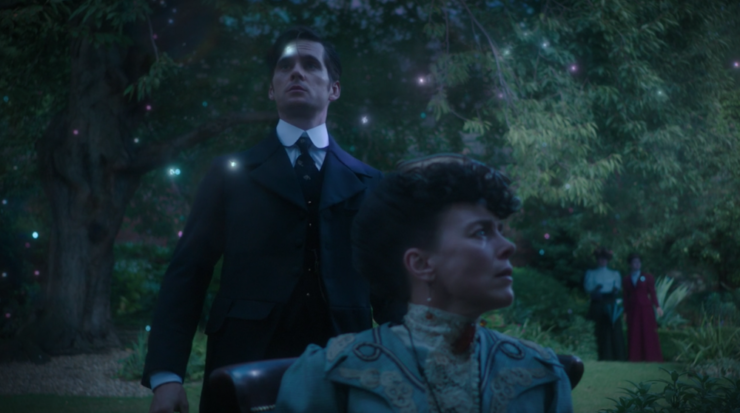
Society lady and philanthropist Lavinia Bidlow (Dollhouse’s Olivia Williams) has set up an Orphanage for the Touched, run day-to-day by grimly efficient psychic Amalia True (Outlander’s Laura Donnelly) and her cheery foster-sister, inventor Penance Adair (Ann Skelly). Between their routines and banter, they are a two-person League of Extraordinary Gentle(wo)men, or perhaps more akin to an elder X-Men duo like Wolverine and Storm: the ones who are in control of their powers, moving through Victorian London searching for other Touched women or girls who haven’t quite come to terms with their gifts.
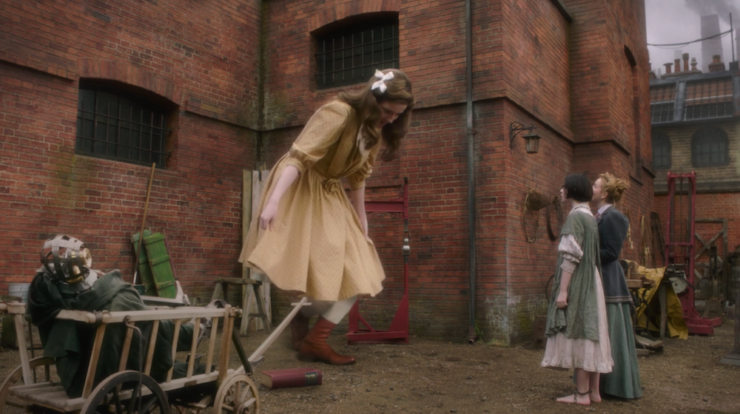
It’s no accident that the Touched refer to their abilities as turns, presumably after the second act of a magic trick as described by Christopher Priest in his novel The Prestige. After the magician’s pledge, but before the prestige, comes the turn:
The magician takes the ordinary something and makes it do something extraordinary. Now you’re looking for the secret… but you won’t find it, because of course you’re not really looking. You don’t really want to know. You want to be fooled.
And perhaps the generation of older men who run London would have been content with being fooled, if not for the Touched counting among its ranks the Maladie (Amy Manson). This female serial killer is giving Jack the Ripper a run for his money, both in body count and one-upping him by killing “actual people”—that is, male psycho-analysts instead of “just” disposable women. There’s a lot of shadowy muttering among the council of middle-aged lords who control Parliament and the Prime Minister: There will be no public statement on the Touched, but there will be plenty of private inquiry into how much of a threat they pose to the British Empire.
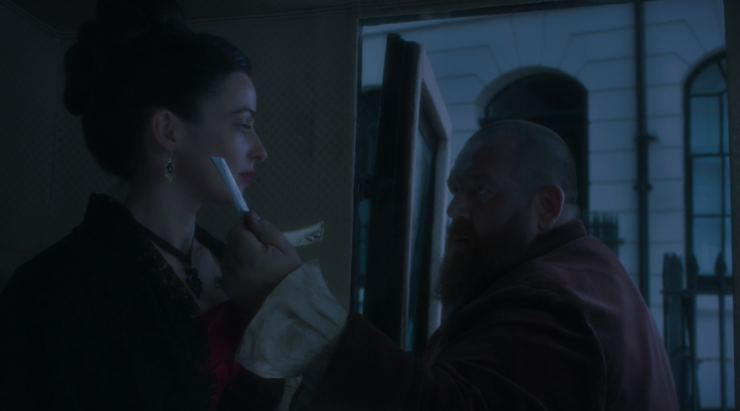
But while the men are afraid of the women, the women are simply trying to make the world better for people like them. Amalia and Penance receive tips about the Touched girls’ whereabouts through underworld dealings with the unsavory Beggar King (Nick Frost), as well as the usual city gossip and scandal. These girls and women have been kicked out of their homes for turns that are not themselves harmful but that mark them as other for deviating from the status quo; a girl who towers ten feet tall, or another who speaks in tongues—not because she’s possessed by the devil, but because her internal language is set to a medley of Turkish, Japanese, German, and, yes, Mandarin.
Their mission to rescue Myrtle the accidental polyglot is complicated by a bevy of creepily-masked men competing to snatch the Touched, equal parts Ringwraiths and Sunnydale’s eerie Gentlemen. While they manage to hold on to Myrtle, it’s clear that they’re being hunted from all sides.
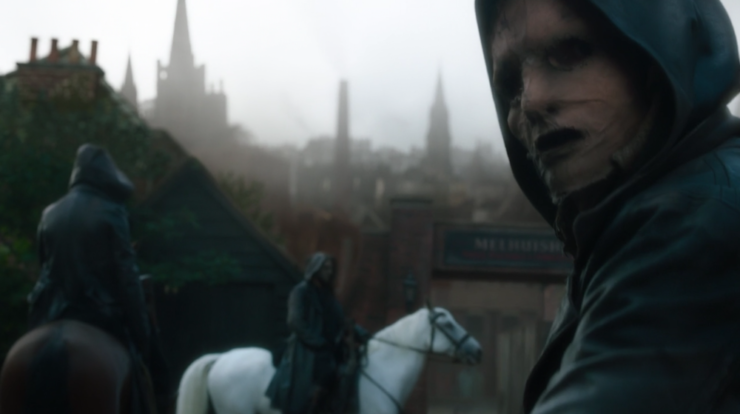
No two turns are alike, which makes sense narratively, but also makes it so that each turn is less a functional superpower and more a fun little quirk. Penance’s turn is that she can see energy, which allows her to create all manner of Tesla-esque inventions in her workshop at the Orphanage, including a nifty three-wheeled prototype that springs out of their carriage during a chase scene with steampunk flair.
Amalia, by contrast, experiences “ripplings” of the future that allow her to guess at their opponents’ next steps, whether it’s a house call or getting dolled up for the opera. The most powerful thing, in Whedon’s alternate Victorian era, is a woman who can see beyond this present.
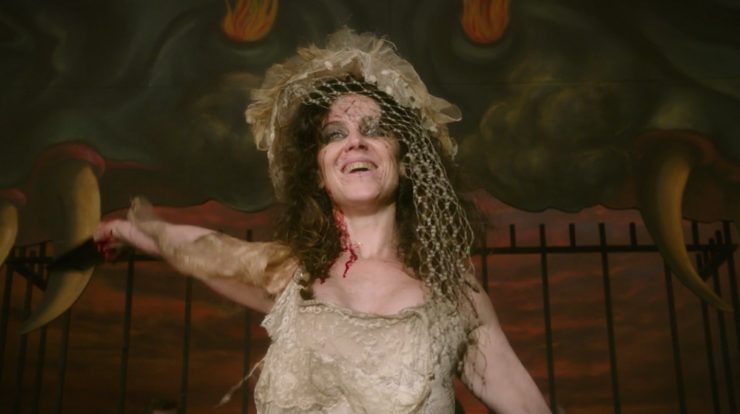
The Nevers pilot crams so much setup into its hour-long running time that it’s difficult to tease out any particular thread. Despite the foothold they’ve carved out for themselves, the Touched have no real allies—not among criminals like the Beggar King, nor with unsympathetic Scotland Yard detective Frank Mundi (Ben Chaplin), clearly not in high society no matter how nicely they clean up to go see Faust, and certainly not with the Maladie, who crashes the performance, slits the Devil’s throat, and embarks on a rambling monologue that feels like it was collected from Drusilla’s cutting-room-floor musings.
The only population that doesn’t seem to have a vendetta against the Touched are London’s young men, like louche pansexual entrepreneur Hugo Swann (James Norton) and his awkward, bird-loving buddy Augie Bidlow (Tom Riley). It takes a long time for the pilot to even introduce these potential allies and/or love interests for the Touched, and their plotlines seem to almost exist in another series: Hugo is trying to turn The Ferryman’s Club, his pagan sex cult, into a legitimate business venture, while Augie is struggling in the shadow of his older sister Lavinia. Their conflicts are awkwardly shoehorned into the pilot, but it gets them to the opera as well, where we return to the much more pressing women’s business.
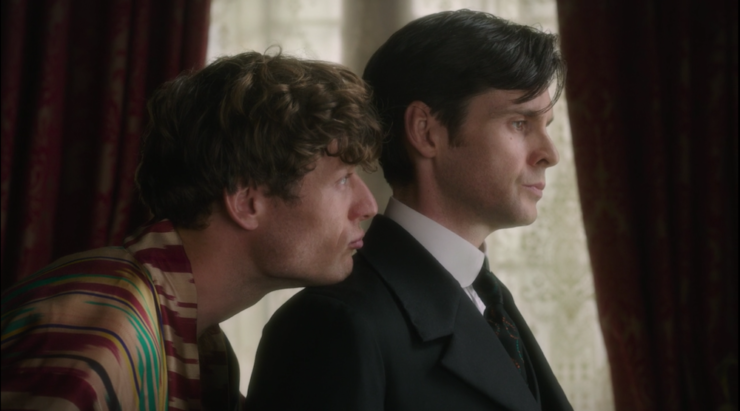
Of all of Whedon’s stock characters in this pilot, Maladie is the most tiresome. Like Drusilla, she is the victim of men who turned her mad—wrongfully carted off to an insane asylum on the day of the event, she clearly suffered at the hands of the psycho-analysts upon whom she is now taking her revenge. But her delivery is yet again the wild-eyed overly-broad rendition of insanity, her chatter full of naked brains and angels, punctuated by gory violence, until she gets interrupted by a song.
If you thought that wide-eyed Myrtle was going to be our River power-waif of the series, that was a red herring. Instead, the Very Special Girl to be protected is Mary Brighton (Eleanor Tomlinson), a fetching redheaded chorus girl who opens her mouth and touches the Touched with her magical song. Only the Touched can see the threads winding from her throat to their hearts—but that means that Penance learns that Augie is Touched as well.
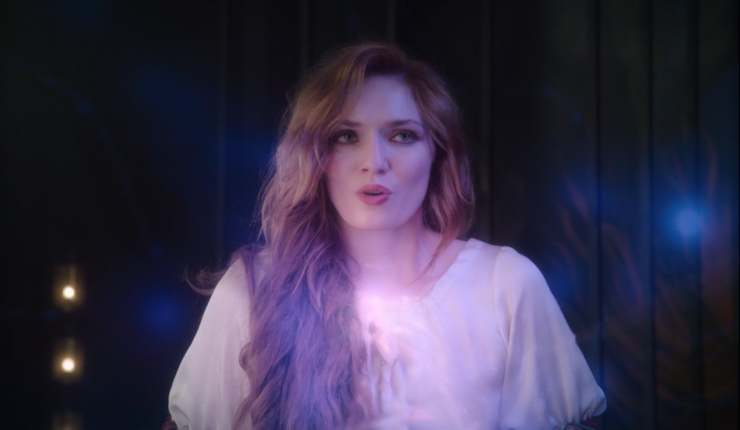
Maladie snatches Mary, despite Amalia’s best efforts at chasing them and an admittedly cool sequence in which she drops several stories and several Victorian layers of clothes. Yet even that winds up feeling reductive, as it ends with two women bloodily fistfighting in their petticoats.
Amalia is a compelling heroine in the sense that she’s a completely familiar archetype of the emotionally closed-off, world-weary powerhouse who clearly has more to her past than even her fellow Touched sisters know. Like Buffy, she seems to hold herself apart and to a higher standard than anyone else; like Echo, she has lived past lives, including her intriguing flashback to the event, which had her jumping into the Thames at the moment everyone became Touched. The most remarkable thing about her is that she’s older than Whedon’s usual heroines, though it’s unclear if Donnelly is playing younger than her 39 years; that she is a widow at least speaks to more life experience than some of the other Touched.
Yet the superhero she seems to have the most in common with is Marvel’s Jessica Jones. She’s got the same hollow stare and red-lipped snarl that Krysten Ritter perfected, as well as an underlying strain of self-loathing. Amalia’s turn is one of the most invisible, yet she makes herself extremely visible through both her pugilistic fighting techniques and her unwillingness to let derisive commentary go unchallenged in polite company (challenging antagonist Lord Massen (Pip Torrens) that the turns are not “tricks” in any dismissive or demeaning sense of the word). You get the sense that there is a monstrousness lurking beneath her genteel demeanor—I half expected her to hulk out after that last fight, especially when Penance stumbled through her usual banter of “You look very fine, Mrs. True” (and Amalia’s shaky return of “I think so, too”). Amalia daring the Beggar King to cut her cheek (“this isn’t my face”) raises further questions of whether we should take any of this dialogue literally or just as Whedonesque heightened language.
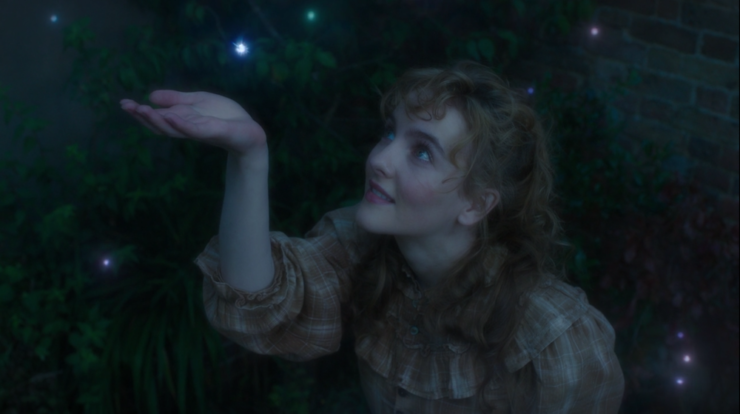
The Nevers pilot ends without setting up much of a big question for the series, so much as a series of conflicts propelled by the various factions who want the Touched dead (Maladie and her rogues gallery), dissected (Denis O’Hare’s creepy doctor), and/or discredited (the council of lords). And yet, the premise has promise, if only there weren’t so many Whedonesque stock characters and gilding of the narrative lily threatening to undermine it.
Despite the power of seeing into the future, as Amalia well knows, there is something disappointing in embodying this persona on the other side of the screen—that is, being the female viewer who can see several plot beats ahead. It’s all right to accept a TV series’ pledge and turn even if we think we’ve seen this trick before, but we need a prestige that we can’t guess, that will have made it worth watching.
So, what is the secret behind the turn? The Nevers pilot ends where it started, flashing back to the event in 1896 and introducing a baffling twist of sorts: It’s not the hand of God or (as I initially assumed) an electrical storm that Touched these people, but some sort of steampunk-esque (yet energy-powered) airship dispensing pollen that indiscriminately lands only on society’s have-nots. It’s clearly otherworldly but otherwise a this-side-of-cheesy-CGI mystery.
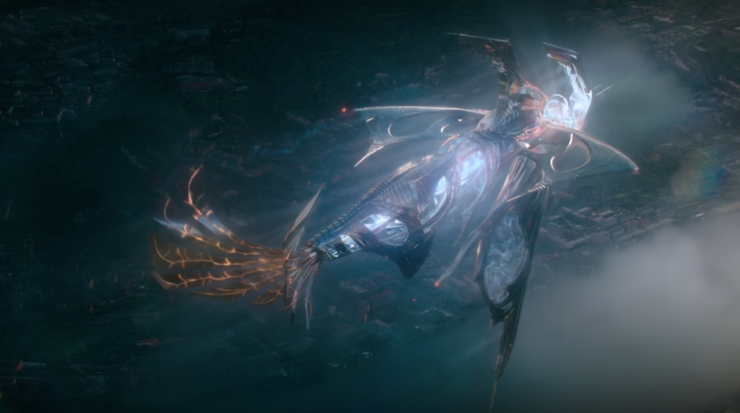
So does that mean that it’s… aliens? Or a rogue inventor who decided to spray London with super-serum? Or the Touched’s future selves, even, in one of Penance’s machines (there’s certainly a resemblance) coming back in time to ensure that they become Touched in the first place? Regardless, it’s a last-minute turn that is indicative of The Nevers’ lack of focus but potential for interesting storytelling.
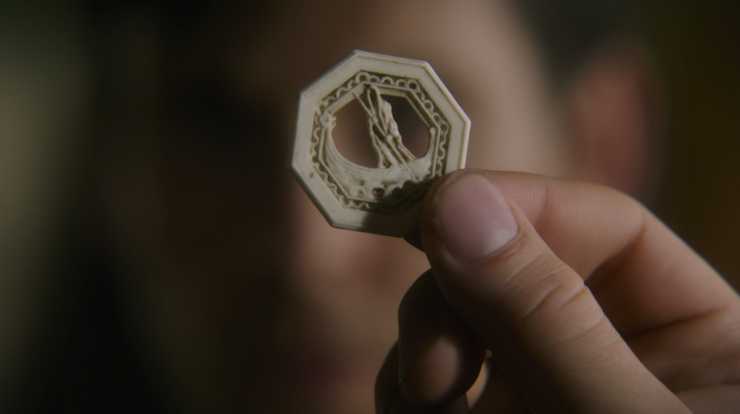
Tricks and Turns
- With the allusion to The Prestige, which is also set in the 1890s… are we talking a shared universe here?
- Amalia asking Myrtle “tīng dé dǒng ma?” was the first of several times that I groaned—this phrase (can you understand) being a favorite on Firefly and, one assumes, an intended Easter egg that instead makes it painfully clear that if you have a River-like waif spouting Mandarin, you have learned very little in 18 years.
- Ditto poor Primrose the giant girl—this seemed an obvious nod to Dawn’s brief stint as a giant in the Buffy comics as a punishment for cheating on her magical boyfriend. Considering the details that have come out about Joss Whedon’s behavior around Michelle Trachtenberg on the Buffy set, this seems like a poor choice for a Whedonverse reference.
- Really hoping that Harriet (Black Mirror’s Kiran Sonia Sawar) is elevated beyond the token brown girl, with her one line about being discriminated against even before she was Touched.
- Was Amalia a widow before or after “the event”? Her jump into the Thames implies that she might have been suicidal, but it’s unclear if that was because she was a woman without a husband or because of her husband.
- Resisting the urge to call it the Touchdown…
- The random chorus girl’s line reading of “oh, I could never leave the the-ah-ter” was genuinely funny.
- The first six episodes of The Nevers’ first season will premiere starting April 11, with the latter six to be released at some point in the future. It will be fascinating to see how the series might change and grow with that time and space apart from its original creator.
Natalie Zutter is bummed that The Nevers doesn’t have proper opening credits, and now has the Dollhouse theme song stuck in her head. Talk female superheroes with her on Twitter!










